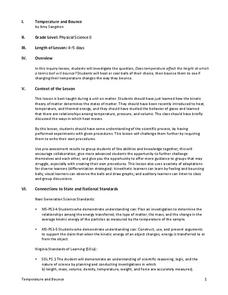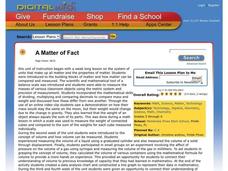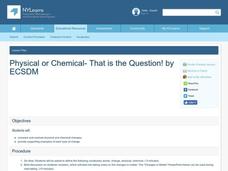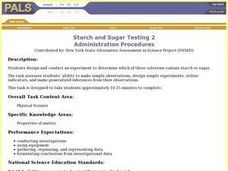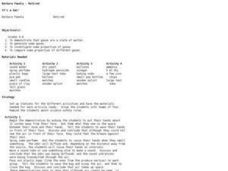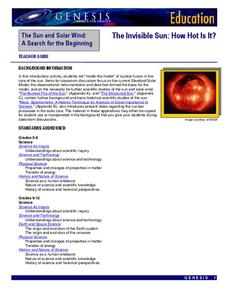Science Friday
Mineral Madness
Science does not need to be as hard as a rock. Pupils test 10 different minerals to determine their properties. The learners observe luster, streak, hardness, and fluorescence for each specimen. Afterwards, they compare and contrast the...
American Chemical Society
Density and Sinking and Floating
Keep your class afloat with a hands-on density lesson. The challenging lesson has learners experiment with different materials to compare their densities. They learn that increasing or decreasing the amount of the material doesn't change...
Curated OER
Properties of Matter: "Sink or Swim"
Third graders recognize that different materials have different properties which can be observed such as texture and bouyancy, and compare and contrast, through observation, ability of some objects to float because of action of...
Curated OER
Exploring the Properties of Matter in the Preschool
Students study the properties of the physical and natural world. For this properties of the physical and natural world lesson, preschool students work at discovery tables to see how simple machines work, what happens when items are put...
Curated OER
What is Matter?
Sixth graders are read Goodnight Moon. They discuss the different kinds of
matter mentioned in the story. Students describe each item
they remember, they are encouraged to observe that some things are
made of smaller pieces, different...
Curated OER
Matter, Matter, Everywhere!
Eighth graders make inquiry about the existence of matter. A definition of the word is needed before students can engage in various activities. The application of knowing about matter is done in the working of experiments.
Curated OER
Up and Atom
"Up and Atom" is a mini-unit introducing middle-schoolers to the wonders of elements. Participants draw atom models, examine the periodic table, compare samples of metals to nonmetals, identify unknown elements, and more! The beginning...
Curated OER
UP AND ATOM
If you are willing to sort through this outline and overlook the portions relating to inaccessible videos, you will find a wealth of support for your introductory chemistry unit. Narrative is presented to help you help learners navigate...
Curated OER
States of Matter and Chemical/Physical Changes Stations
Students break into four groups, starting at different stations. Each station should take about 10 minutes depending on prior knowledge of the topic. They then rotate when everyone is finished to the next station and discuss answers of...
Curated OER
Matter And Its Changes
Fifth graders explore the phases of matter, make observations of matter, the physical and chemical properties of matter, solutions and mixtures, formation of molecules and atoms and molecules all through hands on activities.
STEM for Teachers
Temperature and Bounce
Take part in a fun experiment and hold an impromptu bouncing contest with your class. Young scientists heat and cool balls before bouncing them to determine whether temperature changes affect how they bounce. The set of...
Curated OER
Science: Solids
Second graders investigate the properties of solids and discover how to classify them. Using rulers, they measure various solids on display. In groups, they play an identification game where one students names a location, such as the...
Curated OER
Ooblek
Students demonstrate the three states of matter. In this matter lesson, students read Bartholomew and the Ooblek. Students create "ooblek" and discuss what state of matter it is.
Curated OER
Force and Motion
Students experiment with force and motion. For this force and motion lesson, students test gravity using a variety of objects. Students rotate through a series of stations which use force, motion, friction, and inclines. Students predict...
Curated OER
A Matter of Fact
Students design their own Science experiment. For this science experiment lesson students create a hypothesis related to matter and test it. They displayed their data in a graph.
Curated OER
Physical or Chemical- That is the Question!
Students observe the differences between physical and chemical changes in properties. Through the use of an interactive presentation, the students compare and contrast the changes and provide supporting examples of each type of change.
American Chemical Society
Solubility Test
Make sure to consult the teacher's handbook, Inquiry in Action - Investigating Matter Through Inquiry, for two demonstrations that can be done to introduce solubility and measuring crystal mass before having the class conduct this...
Curated OER
Starch and Sugar Testing 2
Students design and conduct an experiment to determine which of three solutions contain starch or sugar. This task assess students' ability to make simple observations, design simple experiments, utilize indicators, and make generalized...
Curated OER
It's a Gas!
Students investigate gases and their properties by completing 4 activities. In this gases lesson plan, students perform activities to show that gases take up space, they diffuse, and that odors and vibrations pass through gases. They...
Curated OER
Solids, Liquids and Gases
Students are introduced to the various states of matter. After watching a video, they discover how to compare the three states using its shape and volume. In groups, they participate in an experiment with solids, liquids and gases and...
Curated OER
The Scientific Method Using Mystery Powders
Students use the scientific method to determine physical and chemical properties of unknown substances. In this scientific method lesson plan, students discuss chemical and physical properties of substances as a class after a...
NASA
The Invisible Sun: How Hot Is It?
It's getting hot in here! The first in a series of six lessons has learners model nuclear fusion with a simple lab investigation. Groups collect data and analyze results, comparing their models to the actual process along the way.
National Nanotechnology Infrastructure Network
Synthesis and Characterization of CdSe Quantum Dots
Does the size of a sample change the physical properties of that substance? It turns out it can! Young scientists combine physics and chemistry to synthesize CdSe quantum dots and record their color properties. Learners should...
Curated OER
Cents-ible Chemistry-Analysis of the Metal in a Penny
Students determine the base metals and surface metals in a penny. For this analysis of metals lesson plan, students determine the density of five pennies minted in different years. They use different chemicals such as hydrochloric acid,...










